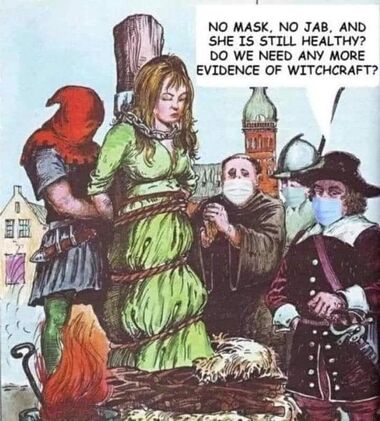Witch
(Enemy image, Mass formation psychosis) | |
|---|---|
 | |
| An enemy image used in the Middle Ages that was acted as a cover for expropriation of property, a forerunner of the modern day "terrorist" |
"Witches" were the subject intense persecution in medieval Europe. Mostly but not exclusively female, they were believed to be a supernatural and malign influence on society. Complex systems of beliefs about witchcraft were developed, which emphasised the need for special authorities to defend people against the well disguised danger ("She is in league with the devil, bring the bishop here to exercise the sprit from her... " etc.)
Contents
Social control
This proved an effective means of social control and was used to enforce existing hierarchies of religion, social class and especially gender. It was exercised mostly in Europe,[1] but also in Salem, USA.
Psychological function
The ritual act of burning supposed witches fulfills specific psychological functions as explored in detail by Rene Girard.[2]
Legacy
The phrase "witchhunt" is used to describe unjust, unreasoning, fear based pursuit of an imaginary enemy. Jon Pullman published a 2019 film about the pursuit of "antisemitism" in the UK Labour party which he entitled WitchHunt.
Modern parallels
"Islamophobia" and the "war on terror" are modern parallels to the witch-hunts of medieval Europe.[1] Witchcraft was termed a "Crimen Exceptum", i.e. "an exceptional crime which required the use of torture to extract a confession",[3] just as "terrorism" was used to introduce a lot of special legislation, including the de facto legalisation of torture.[4] Special "counter-terrorist" experts are often introduced and given specific authority to overrule ordinary authorities such as police in cases decreed to be a "terrorist" nature.
80s "satanic panic"
The day-care child abuse cases that came to public attention in the 1980s, most notably the McMartin Preschool case, have been termed "witch hunts" by the commercially-controlled media and others, since in their view nothing bad happened and people got jailed based on unsubstantiated accusations. Ross E. Cheit of Brown University with his book: The Witch-Hunt Narrative, has demonstrated that in almost all cases he could review serious abuse did take place and mostly ineptitude of police, interrogators and judiciary, at the time confronted with a phenomena that was new and unknown, led to the acquittals.[5][6] Child abuse apologists, like Ralph Underwager and organisations like the False Memory Syndrome Foundation, played their part in helping perpetrators to get free. He spent nearly 15 years on research, poring over old trial transcripts and interview tapes.[7]
The "Unvaccinated"
Considerable effort was made in 2021 to demonize anyone who declined the experimental gene therapies referred to as "COVID vaccines".
References
- ↑ Jump up to: a b http://www.unwelcomeguests.net/327
- ↑ https://charleseisenstein.org/essays/mob-morality-and-the-unvaxxed/
- ↑ https://www.bartleby.com/essay/Witchcraft-Was-Widely-Declared-As-A-Crimen-PKLCUTKLD4HW
- ↑ http://www.unwelcomeguests.net/750
- ↑ https://pubmed.ncbi.nlm.nih.gov/30145960/
- ↑ https://blogs.brown.edu/rcheit/2018/01/28/frank-fuster-and-mark-pendergrast/
- ↑ Abuse Cases, and a Legacy of Skepticism - going so far out with his research as to let videos transcribe from the same law businesses that did the court transcripts 20 years earlier.